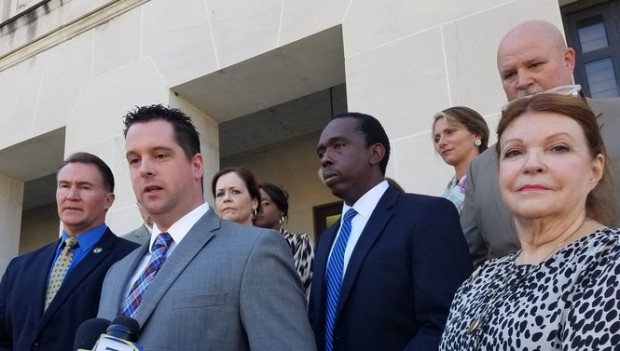This post was originally published on this site

Accused of running their pain clinics as greed-driven pill mills, two Mobile doctors were found guilty Thursday on a slate of federal charges.
Dr. Xiulu Ruan was taken into custody after the verdict, said Dennis Knizley, one of his defense attorneys. Co-defendant Dr. John Patrick Couch was not. Knizley, who did not represent Couch, said Couch has a medical condition that requires daily treatment, involving an infection in his knee, and likely will be taken into custody when that has been cleared up. Sentencing has been set for late May, Knizley said.
Additionally, the doctors face the forfeiture of property and financial assets that prosecutors say were purchased with illicit profits from their Physicans’ Pain Specialists of Alabama (PPSA) clinics. The exact details of the forfeiture appear not to have been finalized, but Knizley said it was “a long list” and Assistant U.S. Attorney Christopher Bodnar said that “it will be in the millions.”
The two PPSA clinics were raided in May 2015 as part of a multi-state DEA sweep called Operation Pilluted. The DEA and prosecutors said that Couch and Ruan had raked in millions by overprescribing potent narcotic pain medications; had ignored signs that clinic nurses were stealing drugs and working while impaired; had systematically handled patients in a way designed to maximize payouts from insurance companies; and had collected speaking fees and other payments that essentially were kickbacks. The array of charges included money laundering, mail and wire fraud and even a violation of the RICO organized crime statute.
The two doctors argued that they had been motivated solely by the needs of their patients, and that everything they had done had been for a legitimate medical purpose and within the bounds of accepted medical practice.
The vague nature of those standards was one of several elements that made the case a complex one. The prosecution, led by Bodnar and fellow Assistant U.S. Attorney Deborah Griffin, took more than a month to lay out its case. The two defendants used separate defense teams. And more than 80 witnesses, including patients, former PPSA employees and medical experts, were called over the course of six weeks.
In light of all that, the jury got to its verdict quite quickly and without stopping to ask any questions of Senior U.S. District Judge Callie V.S. Granade, a circumstance that Knizley said was “very unusual” in such a complicated case. The jury essentially deliberated for just two days, Knizley said: It started work on Friday, then Monday was a federal holiday and on Tuesday deliberations were thwarted by juror illness. The jury met again on Wednesday and delivered its decision early Thursday.
Couch was found guilty on all charges. Ruan was found guilty on all but one, a prescription charge involving a specific patient. Bodnar said it wasn’t yet clear why the jury had rejected the lone count.
Knizley said he expected to file notice of appeal after sentencing. “The fight’s not over,” he said.
One of the questions prompted by the case, and by Operation Pilluted, is whether aggressive criminal prosecution of doctors might have a general chilling effect on doctors, or on their relationships with their patients. Knizley said he was “scared to death” that it would.
“I don’t know how any physician would ever think about prescribing an opioid,” Knizley said. “I think it’s going to have a tremendous, big chilling effect on our community, and everywhere. That a physician now, when he makes a prescription, even though he may have some of the finest doctors in the United States come testify that he was totally within the normal course of medical practice, it can result in conviction and he can go to prison for a long time.”
Bodnar rejected the argument that the case was an attack on the doctor-patient relationship. Looking at the PPSA case files, he said, “there was not much of a patient doctor relationship for a lot of patients.”
Bodnar said the government didn’t dispute that many patients with real needs did receive legitimate treatment at PPSA. That wasn’t the issue, he said. The case was based on the fact that many didn’t, and that there was clear evidence the doctors tailored their prescriptions and procedures to make the most money possible.
The case was “not in any means a condemnation of doctors in general, or the prescription of opioids in general,” Bodnar said. “There is a gray area, and there should be in medicine.”
But the jury had agreed that practices at PPSA fell outside that gray area and represented clear-cut violations, he said.
Bodnar said he believed this was the first time the government had succeeded in convicting doctors on a RICO charge in a pill mill case.
Bodnar declined to speculate on what prison terms Couch and Ruan might receive, saying the government would now evaluate the sentencing guidelines. Based on the verdict, he said, prosecutors likely would ask for prison terms “at the top end” of the sentencing range.
